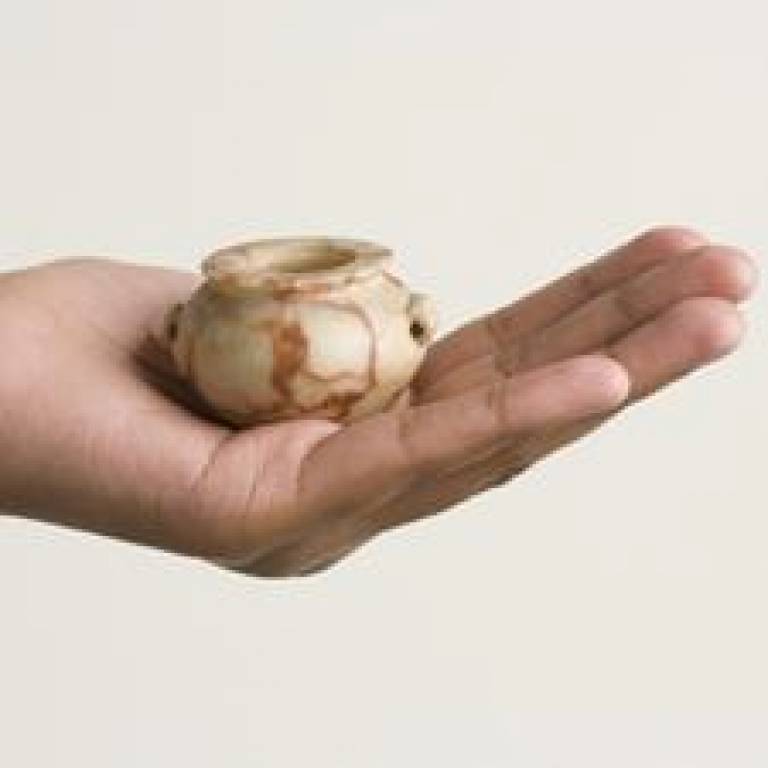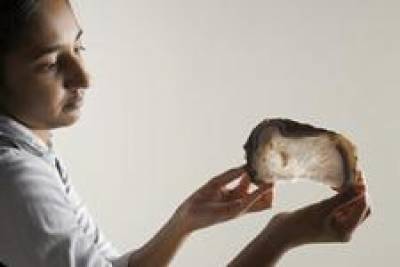Object Handling Therapy - AHRC grant and book launch
17 December 2008
Links:
 ucl.ac.uk/iris/browse/profile?upi=HCHAT26" target="_self">Dr Helen Chatterjee
ucl.ac.uk/iris/browse/profile?upi=HCHAT26" target="_self">Dr Helen Chatterjee
Dr Helen Chatterjee (UCL Genetics, Evolution & Environment and UCL Museums & Collections), and Dr Anne Lanceley and Dr Usha Menon (researchers in Gynaecological Oncology at the UCL Institute for Women's Health) have won a grant of almost £300k by the AHRC to research the therapeutic potential of object handling in hospitals and other healthcare settings.
Working with Guy Noble, UCL Hospitals (UCLH)'s Art Curator, as well as the British Museum, Oxford University Museums Service, Reading Museums Service, Islington Education Library Service and the Museum, Libraries and Archives Council, their project is designed to lead to an understanding of the potential and value of taking handling collections from museums, libraries and archives into hospitals and other healthcare organisations such as care homes.
Dr Chatterjee says: "We are all really excited about the Heritage in Hospitals project; for the first time we are bringing together a group of researchers and professionals who would not normally work together, from museum educators to clinicians. We hope the unique combination of medical expertise and museum object handling will enable us to gain a thorough understanding of the vast potential of a closer engagement between the two sectors, and that the value of 'museum object therapy' can be rolled out more widely across hospitals and other healthcare settings."
Preliminary research conducted by Drs Chatterjee, Lanceley and Menon at UCLH showed that object handling sessions resulted in an increase in patient wellbeing and patients' perception of their health status. Further, they found that patients felt positive about the role of object handling sessions as a distraction from everyday ward life, and that sessions had a positive impact on relationships amongst staff and patients.
Importantly, the pilot research highlighted the deep emotional responses evoked in hospitalised patients handling museum objects. The full psychological impact on patients and the professionals leading the sessions, however, remains to be carefully assessed, and this will be the project's focal point.

Drs Chatterjee, Lanceley and Menon are seeking to develop an effective and robust protocol for heritage engagement with health by fully evaluating the psychological and physical impact of object handling. A freelance artist working alongside the core research team is going to explore the creative element of patient object handling sessions, and there are plans to develop material for exhibitions and displays, including virtual online exhibitions accessible via the project website.
Dr Chatterjee recently edited a volume entitled 'Touch in Museums: Policy and Practice in Object Handling' (published by Berg, and launched at UCL on 10 December), which is linked to the project and explores the roles and value of object handling in museums. 'Touch in Museums' contains a combination of theoretical analysis, policy assessment and detailed case material. It presents a ground-breaking overview of object handling from both historical and scientific perspectives, with the aim of establishing a framework for understanding the role of object handling for learning, enjoyment and health - not only within museums, but also in hospitals, schools and the wider community.
Related to this, under the auspices of the interdisciplinary UCL Centre for Museums, Heritage and Material Culture (a collaboration between UCL Museums & Collections, the UCL Institute of Archaeology and UCL Anthropology), Drs Chatterjee, Beverley Butler and Professor Michael Rowlands held a workshop exploring 'Heritage and Wellbeing' on 10 December, which was the second in a series looking at the social care role of museums. Mark Watson, Heritage Officer of the Valence House Museum in Dagenham, was the seminar speaker, addressing the group on his work using loan boxes with Alzheimer's patients and in schools. This was followed by a discussion forum that explored the workshop participants' work and interests in the field of 'heritage and wellbeing'.
Images © UCL Museums & Collections
 Close
Close

